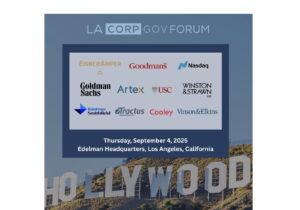
Joseph Zirkman, former General Counsel at Fiesta Restaurant Group
Companies can experience a “double whammy” when activists make suggestions to management about initiatives they’re already pursuing and then take credit for them once the steps are announced publicly. That’s according to Joseph Zirkman, former General Counsel of Fiesta Restaurant Group, which prevailed in a proxy fight with JCP Investment Management in June 2017. In a detailed interview with CorpGov, Mr. Zirkman explains that some of the activist’s claims to have catalyzed change were demonstrably incorrect (such as the appointment of Richard Stockinger as CEO in February 2017 following a search process that preceded JCP’s involvement by several months). Very often, companies are limited in what they can tell investors or the public, creating misperceptions that further complicate the job of senior executives and the board.
Mr. Zirkman has over 25 years’ experience as a public and private company general counsel having served as Vice President and General Counsel of Carrols Restaurant Group, Inc., as Senior Vice President and General Counsel for Fiesta Restaurant Group and currently as Chief Legal and People officer at Sun Holdings Inc.
CorpGov: Tell us about the initial contact with the activist when you were at Fiesta.
Mr. Zirkman: Generally, activists don’t come knocking when a company is hitting on all cylinders. It’s when companies are struggling or underperforming that they find themselves on the activist’s radar – and Fiesta was no different. It had embarked on an aggressive new market expansion a few years back which was not delivering the expected results, so the stock price was taking a hit.
We weren’t shocked when we started to get overtures from shareholders we suspected were activists. The early overtures by activists tend to be friendly and their strategy is to disguise their real intentions hoping to catch the company off guard. It starts with general inquiries about company performance, initiatives, and management’s view on the overall business. They’ll offer “constructive” insights and gather as much information as they can which they will later use against the company. They will try to maintain the friendly veneer as long as they believe they can continue to mine the management team for information helpful to their cause. As the process moves forward, interactions with the activists inevitably become increasingly confrontational.
CorpGov: Did the activist offer new ideas that inspired the board to change?
Mr. ZIrkman: Overall, they provided very little that was not already in process or at least being discussed internally. It’s not as if the company and the board were sitting on their hands hoping the company was going to turn magically around. Fiesta had experienced a number of quarters of declining profitability and had already been actively engaged in dealing with its performance issues. The Fiesta board was extremely professional, engaged and dedicated throughout the process, including well before the activists began making noise.
Often what happens in these situations is a company is actively engaged in exploring strategic options that are not yet public. This limits what companies can and can’t share with the activists. It makes some those conversations a bit difficult and a bit awkward. We were already well underway with respect to trying to turn things around – including doing some of the very things the activists were suggesting, but we were not able to provide confirmation to them of those initiatives without breaching our confidentiality obligations.
It’s a bit of double whammy: First, the activists will actively seek to discredit the company by publicly assailing it with a litany of things they believe the company should be doing, even if privately, the company is already engaging in some of those initiatives. Second, if, down the road, you do end up disclosing that you’re implementing some of these strategic measures, the activists will take the credit for getting the company to change its course.
CorpGov: Did Fiesta consider a sale of the company or other M&A options?
Mr. Zirkman: As all good companies should do, it diligently explored all strategic options. The board was extraordinarily proactive and professional about going through what it felt it needed to do to properly represent its shareholders. The company engaged independent advisors to assist with that process and ultimately determined a sale or other M&A alternative were not in the best interests of the shareholders as a whole.
CorpGov: Was it distracting to you as the General Counsel to deal with the activist?
Mr. Zirkman: I’m not sure I would characterize it as a distraction; however, it becomes a very time-consuming process. As a general counsel your interactions with the board or certain board members increases significantly. In a normal cycle, you may talk to board members two or three times a month, whereas during an activist campaign, communications are daily.
You’re also orchestrating a lot of moving pieces and coordinating with a lot of different constituents because a proxy contest is essentially a PR battle. You’re dealing with your investor relations team, outside law firms, proxy solicitors, the board, senior management and other advisors. It’s like a whole second job that ramps up quickly and remains very intensive.
The other challenge is that the activists tend to control the pace of the campaign. They can issue a nasty press release at any given moment, and you need to be quick and agile to be able to respond in real time. This requires effective and efficient communication with the board and your internal team as well as your outside advisors.
CorpGov: Did you talk directly with the activists during their campaign?
Mr. Zirkman: Early on there was there was a fair amount of direct dialogue with the activists. Once they officially commence their campaign, most of the discussions tend to be through counsel. However, a certain amount of direct dialogue between the activists and certain designated board members continued throughout.
The board also needs to talk directly with other shareholders, not just the activists. Shareholders need to communicate directly with the board, not just through management, attorneys or press releases. The GC needs to carefully manage that process and make sure that it’s a unified message. The activists are looking for any internal conflicts that they can capitalize on, particularly between the management team and the board. A standard tactic is for activists to try to call individual board members and catch them off guard. Board members need to know, early on, that they should not be having ad hoc conversations with the activists.
CorpGov: Why is it important that the directors engage directly with shareholders?
Mr. Zirkman: Activists generally try to do one of two things, or both: They are trying to pressure a company into some type of M&A transaction, or they’re trying to alter the composition of the board. They’re trying to find out if the board is engaged. Is the board informed? Do they know what they’re talking about? Are they capable and qualified? They are also trying to determine whether they are unified or if there are rifts within the board or between the board and the management team.
Board engagement with all the shareholders is important, particularly in the context of a proxy battle. The activists will do a good job trying to sow doubt in the minds of the shareholders that the board is not qualified or capable of overseeing the management the company; that it is not acting in the shareholders’ best interests; that it is entrenched and has made horrible decisions; or is otherwise inadequate. Direct communications between the board and the shareholder base is critical to ensure the shareholders remain confident in the board. Direct engagement also serves to provide the directors with an unvarnished view of investor concerns, without the filtering of the management team.
CorpGov: Was there any substance to the activist’s criticisms?
Mr. Zirkman: As I said earlier, companies that find themselves in the crosshairs of the activist’s gun this are probably not performing. In the case of Fiesta, some of the criticism had merit, but for the most part, the issues they raised were substantially things the company was well aware of and had already begun to address.
But it’s important for boards to be objective – to look in the mirror and do an honest self-assessment. And that’s something that should be done before an activist campaign begins.
CorpGov: If you look back, would you have handled anything differently? Were there any lessons?
Mr. Zirkman: Well, there are some lessons in retrospect, but I’m not sure there was much we could have done differently. Perhaps, preparing ahead of time for the possibility of activists would have been helpful, but it’s always easier in hindsight.
We honestly didn’t believe that the company and its shareholders would benefit from providing the activists with representation on the board. The representation they were seeking were two members of the activist group and a third industry person who was just mediocre at best. None of them had the seasoning, experience or expertise of the existing board members. If, independent of this proxy contest, we were seeking to add new or additional members to the board, none of the activists’ proposed board members would have been even close to making the cut.
But we did engage in settlement discussions with them because we were mindful of the significant disruption and the costs associated with waging a full-blown proxy contest.
CorpGov: How can you prepare for an activist?
Mr. Zirkman: You want to periodically make sure the board members are fully engaged, have the right qualifications and experience and that they are serving the shareholders in the best way possible. You want to make sure you have best in class corporate governance in place to make it difficult for the activists to have a target to shoot at. Also important is having the right advisers available in the event of an activist. You also need to make sure your PR folks have the right skill set and capability to handle an activist.
CorpGov: Would you give the activist credit for anything at all?
Mr. Zirkman: The only thing I would say is it probably accelerated a little bit of introspection on the part of the company as to its corporate governance. It’s not something that the company had ignored, but these campaigns do tend to cause you make changes quicker than you might otherwise.
CorpGov: Any other advice for companies?
Mr. Zirkman: As I’ve said, the notion of directors’ outreach to shareholders has evolved. It’s no longer adequate for management and IR folks to have the sole communications with your shareholders. That’s a little bit of a shift but we’re seeing more of that. I think it’s a good idea because it gives shareholders a sense that they really do have a connection with the board.
Contact:
John Jannarone, Editor-in-Chief
www.CorpGov.com







